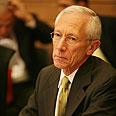
Fischer says crisis has not ended capitalism
צילום: גיל יוחנן
Fischer: Global crisis seems near final stage
Rescue plan by European institutions and International Monetary Fund helped to stabilize markets and global economy, Bank of Israel governor tells IMF-World Bank meeting
The global financial crisis appears to be in its final stages, although some countries are still experiencing a recession, Bank of Israel Stanley Fischer said at an International Monetary Fund-World Bank meeting on Sunday.
"There is still much uncertainty about future developments in the global economy," Fischer said in an e-mailed statement after he spoke at the meeting that was not open to media.
"Hence, every negative piece of information that reaches the markets has a pronounced effect on assessments regarding the continued exit from the recession in various countries around the world," he added.
The Bank of Israel is hosting the IMF-World Bank's Constituency Meeting, which is being attended by IMF Managing Director Dominique Strauss-Kahn and central bank and finance ministry officials from a number of European countries.
He noted that the rescue plan by European institutions and the IMF helped to stabilize markets and the global economy "and the global economy will learn important lessons about how it was formulated and how it will be implemented."
Fischer said that since Asian countries suffered less of an impact from the crisis, the "center of gravity of the world economy is moving gradually towards the rapidly growing emerging markets".
Fischer also rejected the notion that the crisis has ended capitalism, but stressed the attention of economic policymakers around the world must focus on financial system reforms.
'Dual-year state budget an original idea'
Another key focus should be on the extent of fiscal expansion polices adopted by many countries "and the implications of that expansion for those countries' economic future and for their ability to service their sovereign debt," Fischer said."The main lesson to be learned from the crisis is that monetary policy can be effective even when the interest rate is reduced to very low levels, as the central bank can inject liquidity into the market against various types of financial instruments, and can act not only as lender of last resort, but also as market maker of last resort," he said.
Strauss-Kahn was quoted by Israel's Finance Ministry as telling the forum that "the global economic crisis is still not behind us."
He praised Israel's move to adopt dual-year state budgets.
"It's a very original idea that leads to stability and long-term planning," Strauss-Kahn said. "Since moving to a dual-year budget tends to aid the continuation of managing countries' economic policies we will recommend to IMF members to adopt it."










